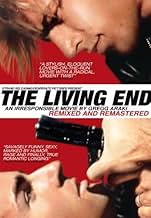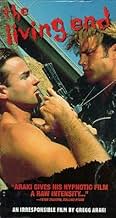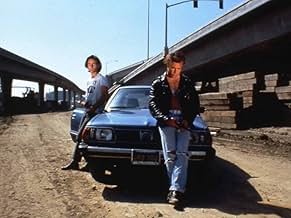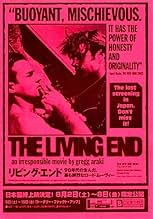IMDb रेटिंग
6.6/10
4.1 हज़ार
आपकी रेटिंग
अपनी भाषा में प्लॉट जोड़ेंLuke is a gay hustler. Jon is a movie critic. Both are HIV positive. They go on a hedonistic, dangerous journey, their motto "Fuck the world".Luke is a gay hustler. Jon is a movie critic. Both are HIV positive. They go on a hedonistic, dangerous journey, their motto "Fuck the world".Luke is a gay hustler. Jon is a movie critic. Both are HIV positive. They go on a hedonistic, dangerous journey, their motto "Fuck the world".
- पुरस्कार
- कुल 1 नामांकन
Brett Vail
- Ken
- (as Bretton Vail)
Chris Mabli
- Melrose NeoNazi
- (as Christopher Mabli)
Peter Grame
- Gus
- (as Peter Gramé)
फ़ीचर्ड समीक्षाएं
A film I enjoyed far more than I 'should' have, given how many individual moments I disliked.
Full of somewhat forced, wanna-be John Waters style humor that is sometimes funny, but often just over-arch and clunky. And some of the acting is weak, the rest only pretty good.
Yet underneath it all there is something moving, honest and raw in its punky rage at the world from an HIV positive point of view.
Sort of a gay, surrealist Thelma and Louise made on a shoestring. For all the moments I rolled my eyes, I feel like it will stick with me over time.
Full of somewhat forced, wanna-be John Waters style humor that is sometimes funny, but often just over-arch and clunky. And some of the acting is weak, the rest only pretty good.
Yet underneath it all there is something moving, honest and raw in its punky rage at the world from an HIV positive point of view.
Sort of a gay, surrealist Thelma and Louise made on a shoestring. For all the moments I rolled my eyes, I feel like it will stick with me over time.
Gregg Araki is certainly one of the strangest directors ever to emerge in the genre of independent filmmaking, and "The Living End" is no exception to his unique style, which is reminiscent of Jean-Luc Goddard while maintaining an individuality that makes it clearly a film by Araki. I've heard the film described as a "gay 'Thelma & Louise,'" but I think this to be inaccurate. This film I think is far more powerful than "Thelma & Louise." Two HIV positive gay men, one the sensible-living perfectly normal Jon, the other the free-wheeling hustler Luke, who from the very first shot in the film we can tell has totally given up as he graffitis "F**k the World" on the wall. More typical Araki catches phrases run rampant throughout the film as these two men go on a road trip around the west coast trying to find something worth their time. What makes the film so powerful is the presentation of its message, rather than the message itself. The difference between sex and real love is subtlely explored as the relationship between Jon and Luke grows more and more complicated, as Luke's hairtrigger attitude often gets them in trouble and Jon steadily wanting to give up love to continue his life for as long as he can and as responsibly as he can, though it never seems to work. Sometimes it's not so subtle, but for the most part the notion of love between these two people is so skillfully handled that the air of sadness that hangs over them just resonates, in spite of the large number of humorous moments. The ending is so brutally sad, though totally unexpected. I won't give it away but you'll have to see it for yourself, it is a wonderful movie. It certainly is not for all tastes. However, if you can appreciate good cinema, then I think this film will not disappoint you. You might not like it, but it is a very powerful film.
10preppy-3
Two HIV+ men go on a road trip. Basically that's about it. It's not as depressing as it sounds. There's lots of humor in the movie but no pulling back on the anger they feel.
The camera-work is shaky, the sound goes from audible to inaudible more than once and there really is no plot. Also, must we have the tired old stereotypes of two lesbians being psychopaths? But the dialogue contains more truth than any Hollywood movie I've seen. For instance, at one point, one of the guys goes "Let's go to Washington and inject our blood in the President. Want to bet they'll find a cure in 30 seconds?" Sadly, I believe they would. This was WAY ahead of its time in 1992. It was angry, in your face and catch a look at a little message after the closing credits,.
Grim, funny, powerful with a sad (but truthful) ending. Also Mike Dytri is one of the most beautiful, hunky men I've ever seen.
A must-see for gay men.
The camera-work is shaky, the sound goes from audible to inaudible more than once and there really is no plot. Also, must we have the tired old stereotypes of two lesbians being psychopaths? But the dialogue contains more truth than any Hollywood movie I've seen. For instance, at one point, one of the guys goes "Let's go to Washington and inject our blood in the President. Want to bet they'll find a cure in 30 seconds?" Sadly, I believe they would. This was WAY ahead of its time in 1992. It was angry, in your face and catch a look at a little message after the closing credits,.
Grim, funny, powerful with a sad (but truthful) ending. Also Mike Dytri is one of the most beautiful, hunky men I've ever seen.
A must-see for gay men.
"The Living End" is definitely not for everyone. But for those who can appreciate its audaciousness and free-wheeling spirit, this film offers bountiful rewards. The two leads are very attractive and play together with remarkable compatibility. They're right in tune with the director's amoral consciousness, and act the heck out of their roles. The "home movie" look to the film contributes to its quality. To me, "The Living End" is a gem of a low budget effort, brimming with vitality and youthful vigor.
Let's see: Bad lighting. Ugly cinematography. Barely audible sound. Profanity laced dialogue. Amateurish performances. Protagonists whose bad behavior is supposed to represent TRUTH. Cameos by Paul Bartel and Mary Woronov. Yep, we are in the world of indie filmmaking, where the mere fact that a semi-coherent film even gets completed on a budget of a buck-ninety-two is considered an artistic achievement. THE LIVING END is a cult film and considered something a landmark of gay cinema to boot. Two guys, who are HIV+ positive, act out violently to protest ... well, to protest just about anything and everything immediately available. The "angry young gay man" syndrome is in play: We're here, we're queer, we're going to be annoying. It was pretty radical stuff for the time; pre-Ellen, pre-Will-&-Grace, pre-Queer Eye. Now, in the era of legalized gay marriage, this seems rather quaintly naive: more Hope and Crosby than Butch and Sundance, let alone Thelma and Louise.
The problem is that, divorced from its historical context, THE LIVING END is just painfully mediocre at best and just plain bad much of the time. Even overlooking the fifth rate production values, you still have a contrived story, badly written, poorly directed and awkwardly acted. The tale involves Jon, who, on the day he learns he is HIV+, encounters Luke, a leather-jacketed stud on the run from freshly killing a trio of gay bashers. Jon is a nerd (he writes film reviews); Luke is a thug (he apparently has also killed a cop); and they head out on the road to who-knows-where. Luke claims he has fallen madly in love with Jon, while Jon seems gaga over Luke apparently because Luke looks hot in a leather jacket (and even hotter minus the jacket). Ultimately their road trip goes nowhere and little is done that couldn't have just as easily been done in Jon's cramped little apartment. Toss in a bothersome side story involving Jon's mother hen (read fag hag) best friend whose sex life goes south as she worries about Jon being AWOL, and the already threadbare narrative is revealed to be even flimsier.
But to give it credit, THE LIVING END was something different in its time. It deals with gay rage, AIDS and gives us anti-heroes who are hardly role models, but at least aren't negative stereotypes from the straight point of view. The film is subtitled "An Irresponsible Film by Gregg Araki," and several of the scenes are provocative. Certainly director Araki is not interested in political correctness, particularly in the way he attempts to link sex and violence as a common impulse. Indeed, the film's most powerful moment comes at the end as it ties rape and suicide into one graphic image. The final scenes are jolting, especially considering the banality of the rest of the film.
I want to be generous to this film because it is sincere and it is important within the subgenre of gay cinema. But it just isn't very good; there just isn't any nicer way to say it. THE LIVING END is a dead end.
The problem is that, divorced from its historical context, THE LIVING END is just painfully mediocre at best and just plain bad much of the time. Even overlooking the fifth rate production values, you still have a contrived story, badly written, poorly directed and awkwardly acted. The tale involves Jon, who, on the day he learns he is HIV+, encounters Luke, a leather-jacketed stud on the run from freshly killing a trio of gay bashers. Jon is a nerd (he writes film reviews); Luke is a thug (he apparently has also killed a cop); and they head out on the road to who-knows-where. Luke claims he has fallen madly in love with Jon, while Jon seems gaga over Luke apparently because Luke looks hot in a leather jacket (and even hotter minus the jacket). Ultimately their road trip goes nowhere and little is done that couldn't have just as easily been done in Jon's cramped little apartment. Toss in a bothersome side story involving Jon's mother hen (read fag hag) best friend whose sex life goes south as she worries about Jon being AWOL, and the already threadbare narrative is revealed to be even flimsier.
But to give it credit, THE LIVING END was something different in its time. It deals with gay rage, AIDS and gives us anti-heroes who are hardly role models, but at least aren't negative stereotypes from the straight point of view. The film is subtitled "An Irresponsible Film by Gregg Araki," and several of the scenes are provocative. Certainly director Araki is not interested in political correctness, particularly in the way he attempts to link sex and violence as a common impulse. Indeed, the film's most powerful moment comes at the end as it ties rape and suicide into one graphic image. The final scenes are jolting, especially considering the banality of the rest of the film.
I want to be generous to this film because it is sincere and it is important within the subgenre of gay cinema. But it just isn't very good; there just isn't any nicer way to say it. THE LIVING END is a dead end.
क्या आपको पता है
- ट्रिवियाThe end credits finish with the following words: "dedicated to craig lee (1954-1991) and the hundreds of thousands who've died and the hundreds of thousands more who will die because of a big white house full of republican fuckheads".
- कनेक्शनFeatured in The Celluloid Closet (1995)
- साउंडट्रैकWhere The Pavement Ends
Performed by Braindead Sound Machine
टॉप पसंद
रेटिंग देने के लिए साइन-इन करें और वैयक्तिकृत सुझावों के लिए वॉचलिस्ट करें
- How long is The Living End?Alexa द्वारा संचालित
विवरण
बॉक्स ऑफ़िस
- बजट
- $22,769(अनुमानित)
- US और कनाडा में सकल
- $6,92,585
- US और कनाडा में पहले सप्ताह में कुल कमाई
- $43,715
- 16 अग॰ 1992
- दुनिया भर में सकल
- $6,92,585
इस पेज में योगदान दें
किसी बदलाव का सुझाव दें या अनुपलब्ध कॉन्टेंट जोड़ें


























